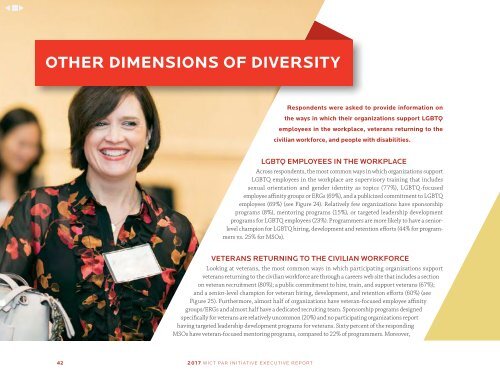Compendium Test
This is a test for the Compendium
This is a test for the Compendium
- No tags were found...
Create successful ePaper yourself
Turn your PDF publications into a flip-book with our unique Google optimized e-Paper software.
OTHER DIMENSIONS OF DIVERSITY<br />
Respondents were asked to provide information on<br />
the ways in which their organizations support LGBTQ<br />
employees in the workplace, veterans returning to the<br />
civilian workforce, and people with disabilities.<br />
LGBTQ EMPLOYEES IN THE WORKPLACE<br />
Across respondents, the most common ways in which organizations support<br />
LGBTQ employees in the workplace are supervisory training that includes<br />
sexual orientation and gender identity as topics (77%), LGBTQ-focused<br />
employee affinity groups or ERGs (69%), and a publicized commitment to LGBTQ<br />
employees (69%) (see Figure 24). Relatively few organizations have sponsorship<br />
programs (8%), mentoring programs (15%), or targeted leadership development<br />
programs for LGBTQ employees (23%). Programmers are more likely to have a seniorlevel<br />
champion for LGBTQ hiring, development and retention efforts (44% for programmers<br />
vs. 25% for MSOs).<br />
VETERANS RETURNING TO THE CIVILIAN WORKFORCE<br />
Looking at veterans, the most common ways in which participating organizations support<br />
veterans returning to the civilian workforce are through a careers web site that includes a section<br />
on veteran recruitment (80%); a public commitment to hire, train, and support veterans (67%);<br />
and a senior-level champion for veteran hiring, development, and retention efforts (60%) (see<br />
Figure 25). Furthermore, almost half of organizations have veteran-focused employee affinity<br />
groups/ERGs and almost half have a dedicated recruiting team. Sponsorship programs designed<br />
specifically for veterans are relatively uncommon (20%) and no participating organizations report<br />
having targeted leadership development programs for veterans. Sixty percent of the responding<br />
MSOs have veteran-focused mentoring programs, compared to 22% of programmers. Moreover,<br />
42 2017 WICT PAR INITIATIVE EXECUTIVE REPORT


